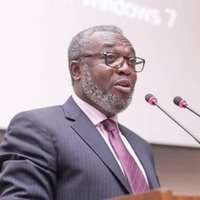Presidential Advisor on Health, Dr. Anthony Nsiah Asare has analyzed the reasons behind the High Emigration of Health Professionals in Ghana and suggests measures to mitigate its impact. He noted that in many developing countries including Ghana, the economic situation is challenging, leading to significant competition for resources and opportunities.
As Dr. Asare further highlighted people, including doctors, migrate to places where they can find better economic conditions or improved career development opportunities. For young doctors, career development is often as crucial as economic factors in their decision to either stay in their home country or migrate abroad.
Dr. Asare recounted that historically, Ghana has experienced waves of emigration among its doctors, beginning in the 1970s when Saudi Arabia sought well-trained medical professionals to help establish its medical schools.
This trend continued in the 1980s and 1990s, with many young doctors leaving Ghana due to the lengthy and unstructured nature of the local postgraduate training system.
“A lot of young doctors were also leaving because it took a very long time to be able to finish a procedure system in the country.”
Dr. Anthony Nsiah Asare Presidential Advisor on Health
Improved Conditions of Health Service
According to Dr. Asare, in response to this situation, the Ghanaian government implemented several measures to retain healthcare professionals. One such measure was the introduction of an additional duty hours allowance to improve the salaries of health professionals, including doctors.

However, this approach faced challenges when productivity did not match the allowances being paid. As a result, the government eventually removed health professionals from the Ghana Universal Salary Structure (GUSS) and consolidated their allowances.
“Create medical villages around the country where there will be amenities and schools and everything for the health workers, where if the person is in a rural area, [we can have ] rural incentives.”
Dr. Anthony Nsiah Asare Presidential Advisor on Health
Dr. Asare highlighted that, another significant development was the establishment of the Ghana College of Physicians and Surgeons over 20 years ago. This institution provided a structured training program for doctors, enabling them to complete their training more efficiently and reducing the incentive to migrate. Dr. Asare emphasized that “these two factors mitigated and reduced the number of people who are migrating.”
Dr. Asare advocates for addressing the push factors that drive doctors to leave Ghana. He pointd out that ensuring decent accommodation for healthcare workers, particularly in rural areas, is crucial.
The government is working with the private sector to develop medical villages with amenities and schools to attract and retain healthcare professionals in these areas. “We have to entice them,” says Dr. Asare, adding that the provision of accommodation and rural area incentives are key to encouraging doctors to stay in Ghana.
Moreover, Dr. Asare highlights the importance of career progression and job satisfaction in retaining doctors. The government is working to streamline postgraduate training programs and ensure that doctors have access to the necessary equipment and facilities, such as CT scans, MRIs, and ultrasound machines. This, according to Dr. Asare, will enhance job satisfaction and reduce the number of doctors leaving the country.
Despite these efforts, Dr. Asare acknowledges the challenges posed by the increasing demand for healthcare professionals in developed countries like the US and the UK. These countries have relaxed their rules and requirements for foreign doctors, making it easier for them to migrate. This trend, driven by the need for more healthcare workers, further exacerbates the brain drain in developing countries.
Dr. Asare stressed that Ghana must focus on creating an enabling environment where healthcare professionals feel valued and supported.
This includes providing adequate compensation, opportunities for career advancement, and a conducive working environment with modern facilities.
By addressing these factors, Ghana can reduce the impact of brain drain and retain more of its healthcare professionals.
Dr. Asare’s view underscored the importance of a holistic approach to tackling this issue, one that combines economic incentives, career development opportunities, and improvements in working conditions.
READ ALSO: Minister OJ Urges Deeper and Richer Gospel Music Content























